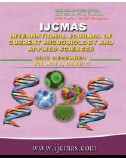


 National Academy of Agricultural Sciences (NAAS)
National Academy of Agricultural Sciences (NAAS)

|
PRINT ISSN : 2319-7692
Online ISSN : 2319-7706 Issues : 12 per year Publisher : Excellent Publishers Email : editorijcmas@gmail.com / submit@ijcmas.com Editor-in-chief: Dr.M.Prakash Index Copernicus ICV 2018: 95.39 NAAS RATING 2020: 5.38 |
Wheat (Triticum aestivum L) stands second in grain production in the world and most widely cultivated food crop. Agriculture in the post-green revolution era postponed the near seen dangerous cloud of the great famine due to population explosion in the third world where there was very low growth rate of crop production as compared to population growth. At initial decades of 21st century, another probability of great famine appeared in the world due to long drought in tropical and subtropical and at the same time it appeared more dangerously because of the contemporary climate change threat. System of Wheat Intensification (SWI) which is based on the principles of System of Rice Intensification (SRI) is a new wheat cultivation technique which might act as a significantly new weapon as a part of climate-smart farming. It is one of the promising technologies to increase productivity which ultimately contributes to the household level food security of marginal farmers. The present study was conducted in Samastipur district of Bihar state in India. 4 panchayats (Thahara, Morsand, Indarwara, Sarangpur) were selected from 2 blocks of Samastipur (Pusa and Morwa) based on assumption that these blocks have the largest number of adopters of SWI technology. The total number of respondents (beneficiaries and non-beneficiaries) selected for the study was 60. Frequency, percentage, arithmetic mean and standard deviation were used as the statistical tools to measure the level of knowledge of the respondents regarding SWI technologies and their attitude towards SWI methods. As a result, it was found that 13.33% of respondents have low level of knowledge among adopters whereas 60% of respondents i.e. majority have low level of knowledge among non-adopters. Besides, 50 percent adopters had favourable attitude and 16.67 percent had unfavourable attitude. While in case of non-adopters categories maximum percentage of respondents had undecided their attitude towards SWI technology i.e. 43.33 percent, followed by 40 percent had unfavourable attitude and 16.67 percent had favourable attitude.
 |
 |
 |
 |
 |